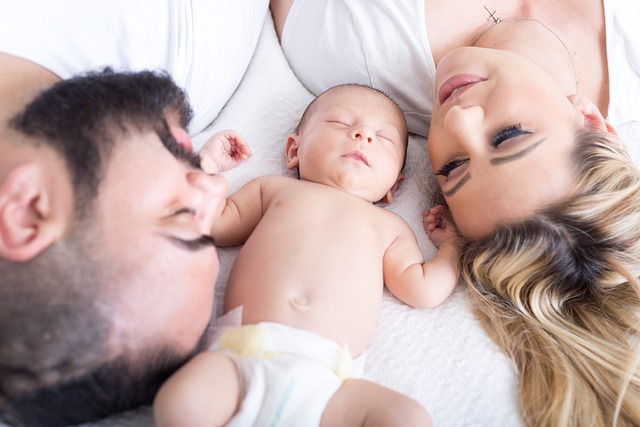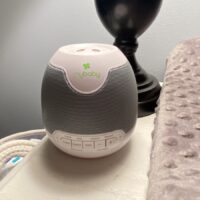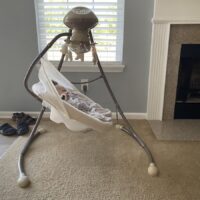It’s no secret parents lose a lot of sleep. A LOT! It all begins with the middle-of-the-night newborn feedings. Then there are the many consolations given after a child’s nightmare.
Or maybe you just deal with a downright difficult sleeper. Many-a-parent is living on a lot of coffee and a few energy drinks to get them through the day. Now, with the help of a new online tool, parents can find out just how much sleep they’ve most likely lost.
The Lost Sleep Calculator is a simple online tool and it is free to use. Just enter in the birthdate of your child or children, and it will calculate just how much sleep has been completely lost and how much has likely been disrupted depending on how old your child is.
For example, a parent of a six-year-old would likely have lost 712 hours of sleep, and had another 906 disrupted.
The challenge for moms and dads is that babies don’t sleep all their hours contiguously. They are asleep for several hours then awake for several hours.
This broken sleep pattern results in disrupted sleep for parents, even in cases where parents find ways to sleep while baby is sleeping.
The sleep loss calculator uses an average of sleep loss results from several studies and calculates a decline in additional sleep disruption over time.
Sleep Loss Studies
Sleep loss studies on new parents have a fairly wide range of conclusions.
A recent study found new parents will average only four hours and 44 minutes of sleep a night in their baby’s first year. That’s 59 percent less than the recommended eight hours of sleep you should be receiving, according to a study performed by Simba, a sleep technology brand.
The Simba survey reported, out of the people they surveyed, 11 percent had hallucinated something was there when it was not, and 44 percent had forgotten what they were saying in mid-sentence.
However, another study in Germany over a 6 year period concluded that moms lose less than an hour of sleep per night on average over the first year.
That study showed that while sleep loss tapers off after the first year, satisfaction with the quality of sleep is impacted through the child’s 6th year.
Comedy or Science?
It can be comical what parents may do when they’ve missed a night of sleep, but it’s also a scientific fact losing sleep affects the brain. According to a study on sleep deprivation, Dr. Itzhak Fried, a neurosurgery professor from the University of California, Los Angeles (UCLA), said, We discovered that starving the body of sleep also robs neurons of the ability to function properly. This paves the way for cognitive lapses in how we perceive and react to the world around us.
Another researcher in the study, Yuval Nir, a sleep researcher at Tel Aviv University in Israel, said, We were fascinated to observe how sleep deprivation dampened brain cell activity. Unlike the usual rapid reaction, the neurons responded slowly, fired more weakly and their transmissions dragged on longer than usual.”
“This phenomenon suggests that select regions of the patients’ brains were dozing, causing mental lapses, while the rest of the brain was awake and running as usual, Fried said.
Because your brain can not work at its best state when it’s sleep-deprived, it only leads to a host of other issues. The National Sleep Foundation (NSF) explains living on little sleep can make your mood worsen, your reaction time become slower, and make you more susceptible to illness because your immune system is compromised.
Plus, it can lead to weight gain because you feel hungrier and make poorer food choices. It can also raise your blood pressure and put stress on your heart.
The NSF also explains that less sleep makes you look less than your best as well, bringing more wrinkles and sagging skin. This is because of cortisol, a stress hormone, is breaking down the skin’s collagen, which normally helps keep your skin looking smooth. This is why many people who are lacking sleep have sagging skin, or bags, under their eyes.
Sleeping Patterns
Parents of newborns expect they’ll be losing sleep once their new bundle of joy is born, but wonder how long it’s going to last, hoping the baby will start sleeping through the night in record time.
According to the NSF, babies typically sleep through the night by six to nine months of age. By six months they typically do not require middle-of-the-night feedings and their sleeping patterns have become more regulated.
Sleep is the body’s way of rejuvenating itself, restoring energy and allowing for proper physical growth and mental development, according to the American Family Physician Organization, Changes in sleep during the first years of a child’s life mimics the physical and mental growth and development that is happening.
So newborns require the greatest total sleep time and have a fragmented sleep-wake pattern. But as children get older, less sleep is needed during the day and the ability to sleep for longer periods of time at night increases.
To follow a healthy sleeping pattern for children, the American Academy of Sleep Medicine suggests the following:
- Infants (4 to 12 months) need 12-16 hours of sleep, including naps
- Toddlers (1 to 2 years) need 11 to 14 hours of sleep, including naps
- Preschoolers (3 to 5 years) need 10 to 13 hours of sleep, including naps
- Gradeschoolers (6 to 12 years) need 9 to 12 hours of sleep
- Teenagers (13 to 18 years) need 8 to 10 hours of sleep
Sleep Disorders?
But many children, even past the baby stage, struggle with sleeping through the night. In fact, sleep disorders in children are a common thing, according to Stanford Health Care. Up to 50 percent of children will experience a sleeping problem, notes the American Family Physician (AAFP).
Children’s sleep disorders can include obstructive sleep apnea when airways become blocked during sleep. A symptom of that can be snoring. There are parasomnia sleep disorders which include sleep walking, sleep talking and night terrors. Other sleep disorders include restless leg syndrome and behavioral insomnia where the child has a learned inability to fall or stay asleep.
The AAFP says sleep disorders should be considered when children are consistently showing irritability during the day, behavioral problems, learning difficulties and are doing poorly at school. Early identification of sleep disorders can prevent negative consequences, such as daytime sleepiness, mood swings, behavioral problems, learning difficulties, motor vehicle crashes in teenagers and poor academic performance.
If you suspect a sleep disorder in your child, consult your family physician. Sleep problems are one the most talked about issues at children’s well visits, according to the AAFP.
Promoting Healthy Sleeping Habits
Dr. Jodi Mindell, Associate Director at the Sleep Center at the Children’s Hospital of Philadelphia, suggests some ways to help children better sleep at night.
First, she suggests a regular bedtime and an earlier bedtime.
We know that babies who go to bed later take longer to fall asleep and wake more at night, said Mindell, author of Sleeping Through the Night: How Infants, Toddlers, and Their Parents Can Get a Good Night’s Sleep. Overtired babies take longer to fall asleep and wake up more often. Mindell suggests a bedtime around 7 or 8 p.m.
A predictable bedtime routine can also help children sleep better at night.
The more frequently babies have a bedtime routine, the better their sleep, she says. And even if your baby has problems sleeping, they’re likely to get better once you institute a routine.
Mindell also suggests putting babies or children to bed awake and allowing them to self soothe.
Babies who can fall asleep independently will sleep better, Mindell says.
Calculating lost sleep or so much more?
It can be fun (or, actually, maybe a little sad) to see how much sleep we are losing with the Lost Sleep Calculator. Through our bloodshot, barely open eyes, we can see the time spent taking care of our little ones. Time spent rocking them, snuggling close or allowing them to crawl into our bed, stealing our covers and pushing us off the mattress. It reminds us how hard parents work and that it is a 24 hour seven days a week job.
But let the Lost Sleep Calculator also be a reminder to parents just how much your baby, no matter their age, needs you. Your work is important and isn’t going unnoticed. That child looks to you for that love, care and complete selflessness you give them.
So, the next time you need to stumble in the dark to your child’s room for yet another middle-of-the-night awakening, take a minute to look into their eyes, hold their little hand, tickle their tiny feet, watch them peacefully fall back to sleep.
Remind yourself, as you fight to stay awake, of all the joy they bring. Your life wouldn’t be the same without this precious one. The difficulty of sleepless nights will one day be only a memory. Cherish it for what it is and remember calculating a little lost sleep for the blessing of raising a child is well worth it.






